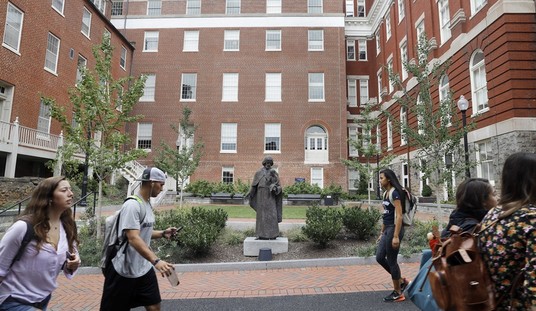We’ve heard a lot about the “higher education bubble” recently, and for good reason: the higher education establishment is on a path of gaseous unsustainability. College fees have been rising at a rate far above the cost-of-living for decades — currently, all-in fees at many elite institutions top $60,000. Think about that the next time you look at your paycheck and contemplate paying for little Johnny’s tuition a few years hence.
But the bubble is not only fiscal. It is also intellectual, social, and moral.
As rich and prestigious and powerful as American universities are, they have, in aggregate, lost their way. The ultimate reasons for this are deep and touch on the uncertain direction of American culture generally, but the symptoms of confusion are there for all to see. The proliferation of non-subjects like women’s studies, gay studies, post-colonial studies, and the like, and the infiltration of traditional courses by the toxic ethic of multiculturalism have turned large precincts of higher education into an antinomian carnival whose end is not education, but some species of political activism or psychopathology.
Just yesterday I was chatting with a young man who told me that at his university you could take a course in “Shakespeare and Postcolonialism,” “Shakespeare and Feminism,” and “Shakespeare and Marxism,” but since an old professor had retired, no course in just Shakespeare. I discuss some of these issues in my book Tenured Radicals, which was first published in 1990 but which I updated in 1998 and 2008. Before that last revision, I had thought about writing a book called Retaking the University, even going so far as to write an essay on the subject for The New Criterion. The more closely I looked into the realities of higher education, however, the more convinced I became that there would be no “retaking” of the institution.
Higher education (and indeed, K-12 education) was teetering on the brink of collapse, but what was going to bring about change was not concerned parents or trustees or alumni, but a revolution outside of education whose effects would transform many things, including the institutional arrangements by which we tend to society’s brighter 18- to 22-year-olds.
That said, parents and high school students who are trying to answer the question “What’s next?” are in need of guidance. For many, I suspect, the answer they give is “something other than a traditional BA.” But for those who have their hearts set on the ivy-embowered halls, good guidance is hard to come by. The official ranking of a college doesn’t provide an accurate guide: Hamilton College in Clinton, NY, to take just one example, is said to be a top-tier liberal arts institution, but anyone who has looked at its performance for the last decade or so knows that it is a pathetic swamp of politically correct, anti-traditionalist animus. So what’s a student to do?
One of the most sensible brief reflections on this subject comes from my friend Stephen Blackwood, president of the gestating Ralston College in Savannah, GA, which when it opens in a year or two will offer a classical curriculum to a small number of students more serious about education than they are about the credential racket or partying. Stephen has a thoughtful essay at the website of the John William Pope Center for Higher Education Policy on the question of “How to Choose a College.”
Two choice tidbits: one sociological, or at least social; the other intellectual. “[O]n a tour for prospective students at an Ivy League university near New York,” he writes:
I was shown a Glee-inspired music video that featured residence rooms and social life but made no mention of classes or academics. It might as well have been describing a cruise vacation. Similarly, some colleges offer “pet-friendly dormitories” or “apartment-style” accommodation.
If you find such marketing campaigns attractive, you might ask yourself what you’re looking for, because it certainly isn’t an education.
Indeed. Then there is the matter of what is taught. Here Stephen offers a bit of advice that goes to the very heart of liberal arts education:
Avoid colleges whose courses don’t have students engage with original sources. Would you be reading Plato, Shakespeare, and Jane Austen, or merely reading what other people have said about them? You want to encounter the books and ideas that change lives directly, not through a pre-packaged conclusion.
A focus on primary sources is not a perfect prophylactic against the viruses of multiculturalism and political correctness. But if the sources are thoughtfully chosen — Shakespeare, not Maya Angelou; Aristotle, not Jacques Derrida — then at least you are dealing with the building blocks of genuine education.
As I say, I am not sure that the institution of higher education in its current incarnation can be retaken or reformed. But it can be revolutionized, and one way that might happen is by the proliferation of genuine alternatives to the status quo. Stephen Blackwood’s Ralston College offers one such alternative. Check it out. I for one hope it thrives.









Join the conversation as a VIP Member